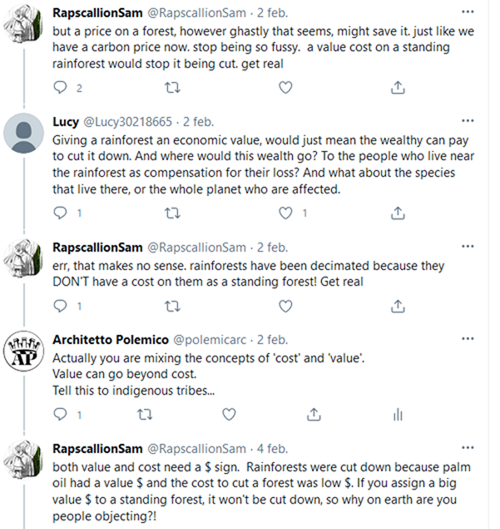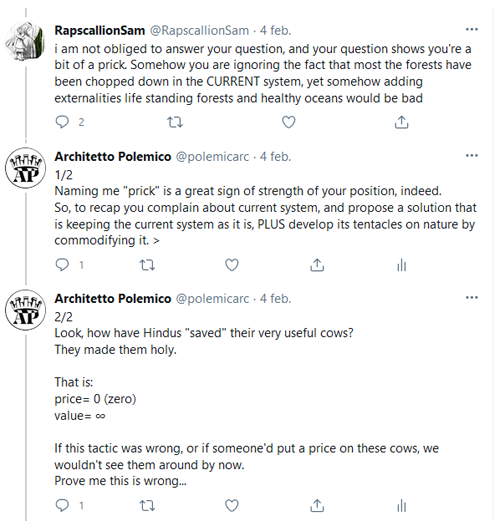What difference is there between price and value? An empirical case exposing the fallacy of false ecologisms.
A little while ago there was this little discussion on Twitter. I link it not because I want you to go over there to troll, but for the sake of completeness (as well as to avoid those who send me private messages on Twitter writing in capital letters «YOU DON'T SOURCE THINGS BECAUSE YOU INVENT IT ALL!!1!2!»). A discussion like many others, in a social-network style –and those who frequent it know what this means - nothing particular but indeed revealing in its deep meaning, because it highlights a –perhaps the– fundamental problem that confuses, deceives and distorts hopes and perceptions of the so-called gretini ecologists (1): the confusion between VALUE and PRICE.
I throw on the table a little reference on the method (not yet translated, so still in Italian sorry) for those who want to oil the gears up before gliding close to the ground with our copilot Launchpad McQuack.
(1) Just a pun with cretino (idiot) + Greta = gretino
User's thesis:
The current economic system destroys natural resources. By assigning a price to these resources you prevent their consumption. Everything should have a price, so we solve the problems that plague us.
Polemical antithesis:
Pricing ecosystems IS continuing the current system that destroys resources.
For the user in question, the difference between value and price does not apply: price fully represents value.
My polemical question: then quantify the price of your life. No answer, except an insult ("prick", which slips on me like a drop of dew on a lotus leaf in the misty morning) before disappearing into thin air as expected. Game, set, match.

The question may seem rhetorical and pretentious, but in reality it uncovers this contradiction: the user avoids answering because, if he did so, he would realize that the price he is about to attribute to his own life does not correspond to the value that he perceives of himself. In other words, he doesn't answer because the question «quantify the value of your life in money» makes no sense. Like his reasoning.
If putting a price on valuable things prevented their destruction, you'd put a price on life. This would possibly have prevented wars.
Or not?
But during the discussion an example popped out that perhaps can be useful to understand this concept, in order to fight this totally capitalist, neoliberal, gnostic, deadly violent and aggressive narrative.Or not?
Let's go and look at others, which is always easier than looking at ourselves. The Hindus, for economic, ecological, geographical, sanitary reasons, etc... had to preserve their cow population.
What do they do, in practice? They make them holy, which means VALUE = ∞; PRICE = 0. Of course: if it's sacred it's not for sale. That's why life is (should be) sacred, that's the reason why my provocative question about the price of life.
The opposite of sacred is not profane, but sacrilegious. The Islamic does not eat pork, as haram, but the function of environmental rule remains, as pigs need a lot of water and mud, and in arid areas where water is scarce it was not a good idea to raise them. Hence the religious norm. Strange, one might say, because (intensive) pig farming is profitable, so according to the logic of the price ...why don't they do it?
Casting out nines: if this reasoning were fallacious, there would be no sacred cows around: they would be priced, bought and ...slaughtered, according to the market prices dictated by the dogma of scarcity. Same thing, overturned, for pigs.

Many think so, many have literally killed Humanity within themselves, and this is connected (in addition to the excessive use of the hashtag #restiamoumani, –stay human– on the Italian networks) to the contempt for humanism, philosophy and, especially, the philosophy of science: these transhumanists will be replaced by a cyborg and when they suffer a cyber attack or a breakdown, they will simply end up in landfills (as they would prefer; after all, the funeral rite is irrational and unproductive). Spirituality in the broad sense collaborates and unites Man and Nature in a coherent continuum. How can one relate himself to Nature and other beings if one denies this dimension, taking refuge in a simple and mechanical economism?
Here is the theorem:
Gnosticism, scientism, capitalism, globalism, liberalism are alienating. They distance Man from the spiritual dimension, transcending the material. When the economic dogmas leach into the depths of the human soul, it poisons and dries up, conceiving biology, feelings, thought, life and the entire universe as a tangle of deterministic, cold and mechanical interactions.
Gnosticism, scientism, capitalism, globalism, liberalism are alienating. They distance Man from the spiritual dimension, transcending the material. When the economic dogmas leach into the depths of the human soul, it poisons and dries up, conceiving biology, feelings, thought, life and the entire universe as a tangle of deterministic, cold and mechanical interactions.
If value = price, then who can pay the price controls, has at disposal, and uses the value; because assigning a price means commodifying, i.e. subjecting to market value: the public good, the public utility, the collective, the supra-economic disappear, annihilated to a minimal figure with a Dollar sign (or the Renminbi). And the resources STILL remain consumable, marketable and privatizable thanks to the quantification, which is a necessary and preparatory condition for this exploitation.
Assuming that by charging negative externalities on consumers (as explained in this previous post), pricing nature and trading it like everything else, according to the dictates of the System ...would be somehow revolutionizing the System is just faulty wrong. Assigning a high price to an asset would not prevent its use (it actually makes its use more exclusive).
Finally, I leave some fundamental reflections by Bazaar (in Italian, I'm sorry for you!) on the subject, underlining that the sustainability of human processes is the consequence of a democratic process that works through balanced rights and duties, in which production –and therefore its negative externalities that the user of above was talking about– is controlled within the sphere of popular sovereignty of those who occupy and tread the land on which they live, preferably for generations. In short, national democracy, certainly not of a liberal type. Any ecologism that is not physiological consequence to democracy is therefore class oppression, imperialism, violence and ideology of suffering. Which then fails because, let's think about it. a poor man pollutes the environment very easily. The Amazon, for example, is deforested by armies of poor seasonal workers by piecework (for third parties of course). Could a price on forests avoid this? Sure? What are we doing to do with the natives, do we make them pay the rent to the International Monetary Fund?
However, I remain open to any observations, criticisms, clarifications, in case someone had a different idea, or wanted to specify the economic concepts, on which I declare myself semi-illiterate, or had references to better integrate the philosophical concepts. (And we close with Pieter-Jan fluttering happily):


...
#
@GND
Posted: 11/02/2021 10:51 — Author(s): Polemicarc
x
Responses
No responses yet ...
Be the first to write a response. ↴